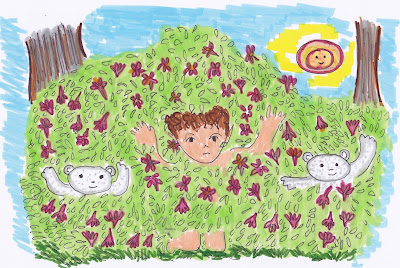English/Spanish blog from somewhere in La Mancha / Blog en inglés y español de un lugar de La Mancha
Welcome / Bienvenidos
Gracias por visitarnos.
Blog Archive
Friday, 17 December 2021
Uncle Gentlerain / Tito Gentillluvia
Sunday, 12 December 2021
Read The PSP? / Leer ¿El PHP?
Sunday, 5 December 2021
Read chapter 159 of Tales of a Minced Forest / Leer el capítulo 159 de Cuentos del Bosque Triturado
You can read Chapter 159 of Tales of a Minced Forest in English by clicking on Plain Jane's Plea.
Puedes leer en español feérico el capítulo 159 de Cuentos del Bosque Triturado pinchando en La súplica de Mari.
Friday, 19 November 2021
Indignation and Erysichthon / Indignación y Eresictón.
Sunday, 7 November 2021
The Fetching / El Reclutamiento
To read Chapter 158 of Tales of a Minced Forest in English, click on The Fetching.
Para leer el capítulo 158 de Cuentos del Bosque Triturado en español, pincha en El reclutamiento.
Monday, 1 November 2021
About Ces and Teddy Bosk / Sobre Ces y Tedi Bosk
Read about Cespuglio Four Moons before the front door of the Dullahan home. Click on Chapter 157 of Tales of a Minced Forest.
Lee sobre Cespuglio Cuatro Lunas frente a la puerta del hogar de los Dullahan. Pincha en el Capítulo 157 de Cuentos del Bosque Triturado.
Friday, 24 September 2021
Theme in Yellow / Tema en amarillo
Theme in Yellow by Carl Sandburg Tema en Amarillo de Carl Sandburg
I spot the hills Moteo las colinas
With yellow balls in autumn. Con bolas amarillas en otoño.
I light the prairie cornfields Ilumino
los maizales de las praderas
Orange and tawny gold clusters Con racimos naranjas y
leonados
And I am called pumpkins. Y me llaman
calabazas.
On the last of October El
último de octubre
When dusk is fallen Cuando ha caído el sol
Children join hands Los
niños se cogen de la mano
And circle round me Y
me rodean
Singing ghost songs Cantando cánticos de fantasmas
And love to the harvest moon; Y amor por la luna
de la cosecha.
I am a jack-o-lantern Yo soy Juanito del Farol
With terrible teeth De terribles dientes
And the children know Pero los niños saben
I am fooling. Que les tomo el pelo.
Carl Sandburg was born in Illinois. His roots were Swedish. He left school at the age of 13. He began his working life as a milkman. He worked at different jobs to be able to pass through different colleges but always left without a degree. He managed to enter West Point but left after flunking a Maths and - surprise! - Grammar test. It ocurred to him to write a biography of Abraham Lincoln and he won the Pulitzer Prize for History for it. He also won the Poetry Pulitzer for his complete poems. He disliked European fairytales and decided to write american fairytales. He titled his colecction "The Rootabaga Stories." He also dedicated time to folklore and published a collection of folk songs, "The American Songbag."
Carl Sandburg nació en Illinois. Era de origen sueco. Dejó el colegio a los 13 años. Comenzó su vida laboral como lechero. Realizó distintos trabajos para poder pasar por distintas universidades pero se iba siempre sin un título. Consiguió entrar en la academia militar de West Point pero se fue de ahí tras suspender un examen de matemáticas y - ¡sorpresa! - de gramática. Se le ocurrió escribir una gran biografía de Abraham Lincoln y con ella ganó el Premio Pulitzer de Historia. También recibiría el Pulitzer de Poesía por sus Obras Poéticas Completas. No le gustaban los cuentos de hadas europeos y decidió escribir cuentos de hadas "norteamericanos." Tituló su colección "Historias de Rutabaga." (The Rootabaga Tales). También se dedicó al folklore, coleccionando canciones locales que publicó bajo el título de "La Bolsa de Canciones Norteamericanas" (The American Songbag).
Preguntas / Questions:
1. How many words in the poem evoke the colour yellow?
¿Cuántas palabras hay en el texto que evoquen el color amarillo?
2. What do children celebrate on the last day of October according to the poet?
¿Qué celebran los niños el último día de octubre según el poeta?
3.Does the poet think pumpkins monsters? Why or why not?
¿Cree el poeta que las calabazas son monstruos? ¿Por qué sí o por qué no?
4. What was Carl Sandburg's first job?
¿Cuál fue el primer trabajo de Carl Sandburg?
5. Was Carl good at Maths?
¿Era Carl bueno en matemáticas?
6. Why is it surprising that he failed a grammar test?
¿Por qué resulta sorprendente que haya cateado un examen de gramática?
7. Whose biography did Carl write?
¿De quién era la biografía que escribió Carl?
8. How many times did Carl win a Pulitzer Prize?
¿Cuántas veces gano Carl el premio Pulitzer?
9. Why did Carl write "The Rootabaga Stories?"
¿Por qué escribió Carl "Historias de Rutabaga?"
10. What is "The American Songbag?"
¿Qué es "La bolsa de canciones norteamericanas?"
Labels
Blogroll
-
-
-
-
-
-
PHONETICS SYMBOLS9 years ago
-
-
Your Sunday Austen Meditation3 years ago
-
-
Humble Heather10 years ago
-
-
-
-
-
-
Para Aprobar Ingles en la ESO13 years ago
-
-
-
-
-
-
-
-
-
-
-
-
-
-
-
-
-
-
-
-
-
-
-
-
-
-
-
-
-
Abdur Biswas (Sep 1, 1926 - Nov 3, 2017)7 years ago
-
-
-
-
-
-
-
-
-
-
-
-
-
-
-
-
-
-
-
-
-
-
-
-
-
-
-
-
Play the race card1 year ago
-
-
-
I Went to the Movies4 years ago
-
Giovanniby Fatimah Asghar6 years ago
-
-
-
-
-
-
-
-
-
-
-
Merry Christmas!11 years ago
-
-
-
-
-
-
-
-
-
-
-
-
-
-
-
vacation dick2 years ago
-
-
-
-



















.jpg)














